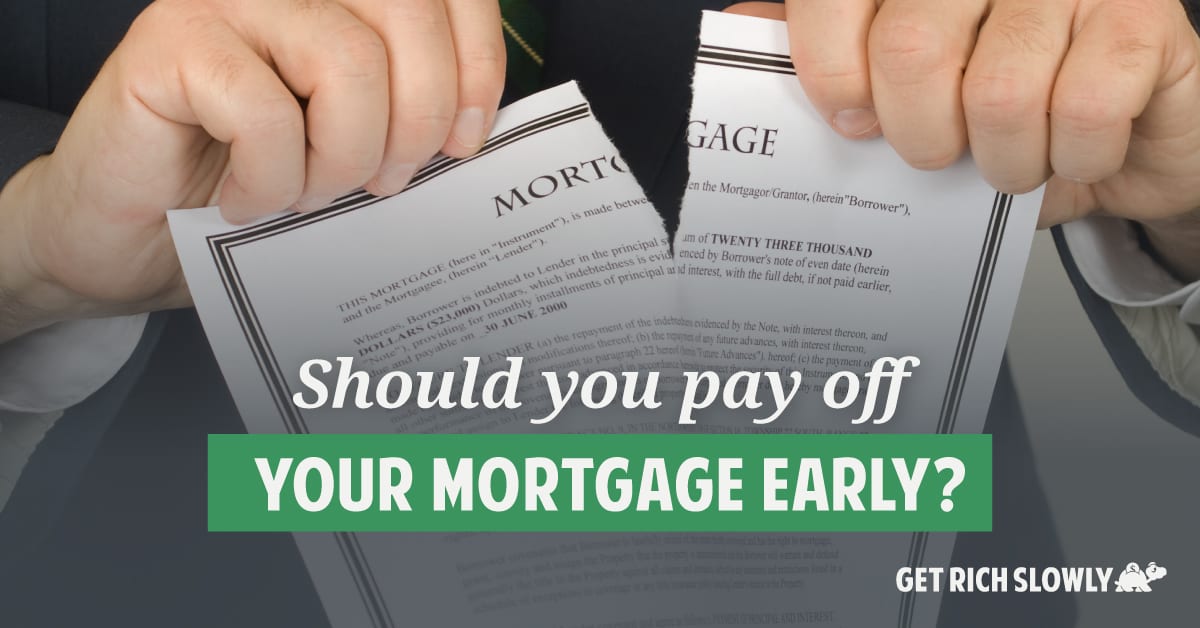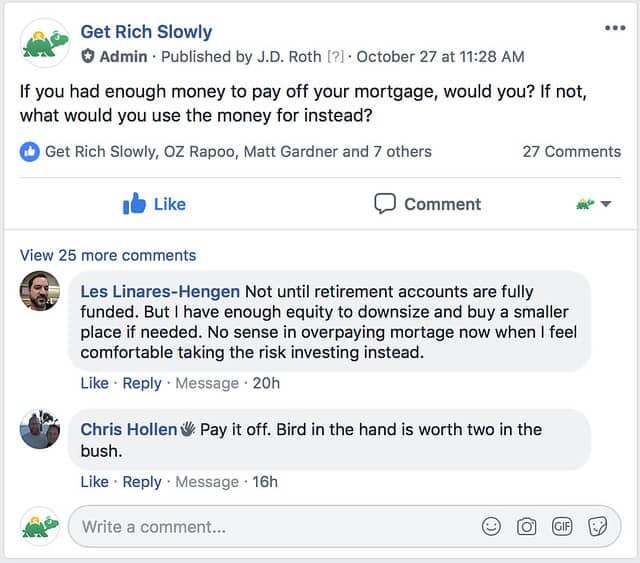Should you pay off your mortgage early?

My friend Amy recently wrote with an interesting dilemma. “Should I pay off my mortgage early?” she wonders.
Amy has a high-paying job and has managed to save enough that she could be completely debt-free if she wanted to. And she kind of wants to! But is this the best choice? She’s aware that this is a nice problem to have — but it’s still a bit of a muddle. She’d like some guidance.
Here’s an abridged version of her email:
I’m wondering if you have any advice for me related to paying off a mortgage vs. keeping it for tax purposes.
Here’s the basic rundown: I have 22 years and $103,000 left on a 30-year fixed-rate mortgage at 3.95%. My monthly payment is $668 per month. I will pay about $48000 in interest this year. I pay both my taxes and insurance out of pocket annually.
The past two years, I’ve made close to a quarter of a million dollars each year, and this year I will likely exceed that amount. This is a wonderful place to be. With no other debt, I’m contemplating whether I should completely pay off my mortgage in one swoop come November when I get my bonus.
I have advice coming from both sides. My accountant warns me against it, as I would have no other write-offs to offset my high income. However the freedom of being DEBT FREE sounds amazing, even if it comes with a high tax bill.
I would love your advice (or the advice of your readers, if this offers an opportunity to share with them).
My stock answer to this question — which I get a lot — has always been: This is a no-lose situation. Deciding whether you should pay off your house is a case where either option is awesome.
Mathematically (and financially), the best choice is almost always to carry the mortgage. However, many people receive a huge psychological boost from not having a mortgage. In other words, this is one of those situations where the smart financial decision and the smart psychological decision aren’t necessarily the same.
Although Amy is asking specifically about the tax implications, let’s start by examining the Big Picture.
The Pros and Cons to Paying Off Your Mortgage
Just so everyone is on the same page, here’s a quick look at the pros and cons to paying off your mortgage. There are advantages and disadvantages to both choices. Are certain advantages more important than others? You make the call.
Here’s why you might want to pay off your mortgage early:
- Whenever you pay off debt — including your mortgage — you earn a guaranteed return on your money. The stock market returns a long-term average of 6.8% (real returns), but average is not normal. There’s a lot of risk involved investing in the stock market. If you’re not comfortable with that risk, paying off your mortgage is a fine investment. More on this in a moment.
- I like to think of home equity as a “store of value”. When you pay down your mortgage, it’s like putting money in the bank (albeit money that’s harder to access). That equity can be tapped when needed. In the meantime, it slowly appreciates (assuming the value of your home increases).
- If you’re currently paying private mortgage insurance — typically in cases where you have less than 20% equity in your home — then paying down your mortgage will help you eliminate that cost. This isn’t applicable to Amy’s situation, but it’s something others might want to consider.
- There’s absolutely a sense of relief that comes from being mortgage-free. You know that if things go to hell — you lose your job, the economy tanks, et cetera — at least you have a place to live.
On the other hand, there are reasons you might want to keep a mortgage for as long as possible. Here are some reasons you might decide you’d rather not pay off your mortgage:
- If you believe you can earn a higher rate of return investing elsewhere, then that’s the most sensible choice. In our recent era of low mortgage rates and high stock market returns, for instance, the logical choice was to invest in the stock market instead. In the 1970s, though, when mortgage rates were high and the stock market was lethargic, this wouldn’t have been a smart decision. (Here’s a simple calculator that can help you weigh this decision.)
- Some folks — like Amy’s accountant, apparently — believe that the tax breaks from your mortgage make it worth keeping. The home mortgage interest deduction, they say, helps to lower your obligation at tax time. While this is technically true, it’s a poor trade. (You’ll see why in the next section.) Still, as part of the Big Picture, it’s an influencing factor.
- Although it’s not often a consideration, inflation is actually your friend when it comes to a mortgage — especially a 30-year mortgage. I bought my first home for $108,000 in 1993. If I had kept that home and mortgage, I’d still be paying on it until 2023. But I’d be paying with current dollars, which are only worth about 57 cents compared to 25 years ago. Inflation is generally the enemy; with a mortgage, it’s your friend.
- Finally, it can make more sense to keep your mortgage if you value liquidity. That is, if you want and/or need cash, keeping the mortgage can be the better option. Once you give your mortgage company your money, it’s a pain to get it back.
Because of my own situation, I feel like that last point deserves a closer look.
You see, I’ve been without a regular income for more than five years now. I’m living off my savings. It’s true that I have substantial savings (for which I’m grateful), but much of it is held in retirement accounts that cannot be tapped without penalty until I turn 59-1/2. (That’s less than ten years away now!)
I have a roughly $300,000 nest egg to last me the next ten years. If the stock market falls, that number will shrink. There’s a part of me that wishes I hadn’t been required to pay $442,000 cash for this house last year. It’d make me feel better to have some of that equity — maybe half of it? — in the stock market and savings accounts instead.
As it is, I could be in a pickle if it turns out I need more cash.
The Home Mortgage Interest Deduction
Because Amy asked about the tax implications of paying off her mortgage, let’s tackle that before we dive deeper.
Here in the United States, homeowners are allowed to deduct their mortgage interest from their income taxes provided certain conditions are met.
The basic conditions are relatively easy to understand. But as with anything tax-related, there are a lot of exceptions and complicating factors. For more info, consult this IRS guide to home mortgage interest deductions. You can also download the 17-page IRS Publication 936 in PDF form.
Let’s assume that Amy makes (as she hopes) $250,000 this year. Using the income tax tables for 2018, we can see that her marginal tax rate would be 35%. (This means that the last dollar she earned is taxed at 35%.)
She’d be taxed $45,689.50 on her first $200,000 of income, then $17,500 (35%) on the next $50,000. Her total tax would be $63,189.50 and her effective tax rate would be 25.3%. (Her tax liability would be 25.3% of her income.)
Amy says she’ll pay roughly $4800 in mortgage interest in 2018. If she’s able to fully deduct that interest, that means she’s able to reduce her taxable income from $250,000 to $245,200. This would reduce her tax liability from $63,189.50 to $61,509.50 — a total of $1680.
This is the part that confuses many people. Income tax deductions reduce the amount on which you’re taxed, not the amount of tax you owe. It’s a subtle but important difference. (Tax credits reduce the amount you owe. Here’s what the IRS has to say about the difference between tax credits and tax deductions.)
If the home mortgage interest deduction actually reduced Amy’s taxes, she’d save $4800 this year. Instead, she’s only saving $1680. For each dollar she pays the bank, the government is reducing her taxes by 35 cents. Sound like a good deal? If so, let’s talk! I’d be happy to give you $35 in return for $100.
Like many others, I find the “you should keep a mortgage for the tax deduction” argument unconvincing. Here’s how my accountant once put it: “You shouldn’t look at the tax savings as a reason to purchase a home. It’s only one component, and a minor one at that.”
This is especially true since if Amy is unable to come up with enough other itemized deductions to exceed the $12,000 standard deduction. If that’s the case, there isn’t any tax advantage to the mortgage.
The IRS website has an interactive tax assistant. As part of that, there’s an automated interview that helps you determine what you’re able to deduct for mortgage interest.
The Math of Paying Down Your Mortgage
Have you noticed that we keep talking about the “guaranteed rate of return” that comes from paying off your mortgage? Yet we haven’t talked about what that guaranteed rate of return is. Let’s take a moment to do that.
- If you don’t itemize your tax deductions, your rate of return on prepaying your mortgage is simply your current mortgage rate. Let’s say you have a mortgage with a 3.95% APR like Amy. Paying that down gives you a guaranteed 3.95% return.
- If you do itemize tax deductions, your guaranteed return is a bit more complicated to calculate. To do so, convert your marginal tax rate to a decimal and subtract it from one. Then, multiply that number by your mortgage rate.
Let’s use Amy’s situation to explain that last point.
Amy’s marginal tax rate is 35%. If we convert that to a decimal, we get 0.35. If we subtract that from 1, we get 0.65. If we multiply that by her mortgage rate (3.95%), we get 2.57%.
If Amy were to pay off her mortgage early, she’d earn a guaranteed 2.57% return on her money.
This is much, much less than the 6.8% real return Amy should be able to earn if she routed that money to index funds instead. The catch? As mentioned earlier, stock market returns are not guaranteed.
(I’m going to leave out compound interest vs. simple interest calculations because I’ve already spent too much time on this article. Suffice it to say that stock market returns compound while the returns from prepaying your mortgage do not. If you’re dying to see a discussion of this, check out this article at Afford Anything.)
If you make your decision based only on math and logic, it makes sense to keep your mortgage as long as possible. But nobody makes decisions like these based purely on logic. Not even financial “experts”.
Want to know more about the math of paying down your mortgage? My buddy Todd Tresidder, the Financial Mentor, nerds out on this stuff. Follow that link to read his advice. The short version? He used to be in the “pay off your mortgage” camp. Now he thinks the opposite. (If you’re a money nerd, Todd provides some of the best mortgage calculators I’ve found. Check them out!)
What the Experts Say
 What do the actual money experts think about this debate? They’re divided. Some think you should do what you can to pay off your mortgage early. Others think that’s a dumb idea.
What do the actual money experts think about this debate? They’re divided. Some think you should do what you can to pay off your mortgage early. Others think that’s a dumb idea.
Here’s a round-up of opinions from some of the money manuals in my library.
- Ric Edleman (Ordinary People, Extraordinary Wealth): Never own your home outright. Instead, get a big 30-year mortgage and never pay it off — regardless of your age and income. “Every time you send an extra $100 to your mortgage company, you deny yourself the opportunity to invest that $100 somewhere else.”
- Suze Orman (The Laws of Money): Invest in the known before the unknown. Paying off your mortgage offers a guaranteed return on investment. “You cannot live in a tax return. You cannot live in a stock certificate. You live in your home.” (Or on your private island.)
- Elizabeth Warren (All Your Worth): Save 20% of your income. Use 10% for retirement savings, 5% to accelerate your mortgage, and 5% to save for future dreams. “Paying off your home also does something many financial planners neglect to mention: It gives you freedom. Once that mortgage is gone, just imagine all the freedom in your wallet.”
- Dave Ramsey (The Total Money Makeover): Prepay your mortgage if you can, but only after you’ve saved an emergency fund, and only if you’re putting at least 15% of your income toward retirement. Don’t use a program designed by a broker; use your own self-discipline.
- Joe Dominguez and Vicki Robin (Your Money or Your Life): “Pay off your mortgage as quickly as possible.” This advice is from 25 years ago, when mortgage rates were higher. While writing this article, I emailed Vicki to ask if her advice is the still the same. It is: “My choice is to not have debt and to live in a house I can afford.”
- Charles Givens (Wealth Without Risk) offers a novel approach to prepaying a mortgage. “On the first of the month when you write your regular mortgage check, [include extra] for the ‘principal only’ portion of the next month’s payment.”
I’ve read hundreds of money books during the past fifteen years. Many authors have commented on this issue. Some experts argue in favor of keeping your mortgage; other experts argue in favor of becoming debt-free. There’s no consensus.
When I first wrote about paying off your mortgage more than a decade ago, I linked to a Yahoo! Finance article by Laura Rowley. That article has vanished, which is a shame. In that piece, Rowley offered some interesting background on this debate:
Why do so many people choose to put extra money into a mortgage when other options would likely increase their wealth? “This is really remnant of Depression mentality that has persisted from generation to generation,” says [one expert]. At the time, most mortgages had one- to five-year terms, with a lump sum payment due at the end.
“Any shock to income meant you couldn’t afford your payment — mortgages were much more susceptible to economic uncertainty,” [the expert says], and roughly one-quarter of Americans were unemployed during the Great Depression. “It’s fine to pay down your mortgage if it gives you peace of mind, but you should recognize what that peace of mind costs.”
Rowley is suggesting that the “pay off your mortgage if you can” mentality is the product of a scarcity mindset. It’s a decision born out of fear. Keeping the mortgage, on the other hand, is a sign of an abundance mindset, a belief in a positive future. (Do you agree with her?)
What My Colleagues Say
Yesterday, I polled some of my colleagues who write about real estate. These folks live and breathe housing and mortgages, so they know their stuff. I was curious what they thought about paying off a mortgage early.
My pal Coach Carson said:
My wife and I have debated this exact question on our personal residence. We love the idea of simplifying our lives and reducing our risk. But thus far we’ve decided not to.
Overall, I see paying off your mortgage early as a decision that balances peace of mind (low risk) and growth (return). The more weight you give peace of mind, the more likely you are to pay off your mortgage early.
Scott Trench, the President of real-estate site BiggerPockets and author of Set for Life, told me:
Whether you should pay down your mortgage is less of a mathematical problem and more of an emotional one.
- If I’m in wealth accumulation mode, or trying to operate my decision-making for the largest amount of long-term wealth possible, I’m going to invest in an alternative rather than pay down my mortgage.
- However, once out of wealth accumulation mode, paying down a mortgage seems to be hugely popular. A paid-for home can make a huge difference in the amount of cash flow needed to fund your lifestyle.
I go into a bit more detail about the math behind paying down a home in this article.
Finally, here’s advice from Mindy Jensen, host of the BiggerPockets Money podcast (and Mrs. 1500 Days):
Most people overlook the incredible power of having a paid-off mortgage. I can sleep just fine while still having a mortgage, but some people get the heebie-jeebies having any sort of debt at all.
However, if you’ll do something with this money that can return a higher yield than your current mortgage, it’s a no-brainer to not pay it off.
We’ve saved enough money to pay off our mortgage at any time, yet continue to keep the mortgage because we can make more money investing in the stock market (or investing in real estate) than we pay in interest to the loan. Our rate is 3.25% and we will keep it for the entire length of the mortgage.
Among my friends who make their living from real estate, there’s more of a consensus than there is among traditional money experts. The real-estate pros all say the same thing: From a mathematical perspective, it’s best to keep the mortgage. But from a mental perspective, sometimes the best choice is to pay it off.
Conclusion
There are some corners of the interwebs where people are flabbergasted that you’d want to carry a mortgage. A lot of folks think that if you can pay off the debt, it’s a no-brainer. They’re wrong. The math argues in favor of keeping the mortgage.
As my friend Amy has discovered, however, this decision is more about mindset than it is about math. And sometimes even the math makes paying off the mortgage the best choice.
- In the unlikely even that you’re carrying an adjustable-rate mortgage, paying it off is a smart idea, especially now that rates have begun to rise.
- If you wouldn’t otherwise use the money productively — if you’d simply spend it on consumer goods, for instance — then you should absolutely prepay your mortgage. Keeping the mortgage is only a smart financial choice if you put that money to work for you!
- If you’re nearing retirement, it probably makes sense to pay off your mortgage. Generally speaking, you want to reduce risk as you get older. Eliminating the mortgage is one way to do that. Some folks argue that paying off your house is actually another form of retirement saving.
- If your mortgage debt is a heavy psychological burden, it probable make sense to get rid of it. Becoming mortgage-free means you’re also free from the time and energy spent managing the mortgage. This is a real benefit, even if you can’t put a number on it.
There you have it, my friends, 3000 words on whether or not you should pay off your mortgage early. And in the end, the answer is: It depends.
The bottom line is this is a no-lose situation. Both options are good. If you’re fortunate enough to have the cash to pay off your mortgage, and if doing so would make you happy, then you should pay off the house. Otherwise, keep the debt and put the cash to work elsewhere!
Footnote
We seem to be getting three common comments over and over, so let me address them.First, this is a new article written in October 2018. There are old comments from 2006 below because we’ve combined the comments on four previous, similar articles into this piece.
Second, a lot of folks took issue with my (flawed) hypothetical interest example. I’ve gone back and replaced those numbers with actual figures from Amy’s loan. I’ve re-calculated everything, and the figures should be correct.
Third, many people have pointed out that the new standard deduction is higher in 2018, and that Amy would need to exceed that in order to itemize. Yes, this is true. I thought it was obvious, so I didn’t include this caveat in the original article. I’ve added a disclaimer to reduce the number of comments on this point.
Let me know if there are other errors or omissions I should fix!
Become A Money Boss And Join 15,000 Others
Subscribe to the GRS Insider (FREE) and we’ll give you a copy of the Money Boss Manifesto (also FREE)


